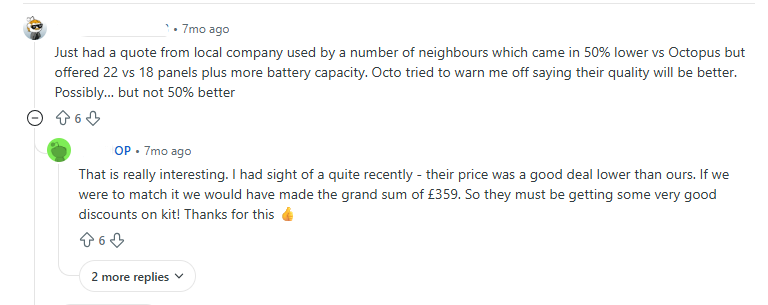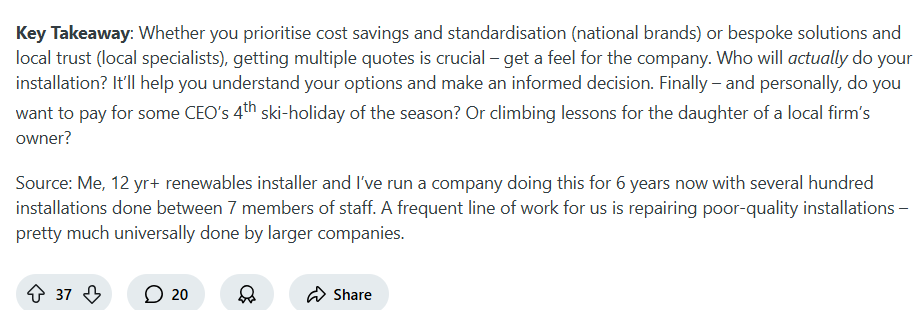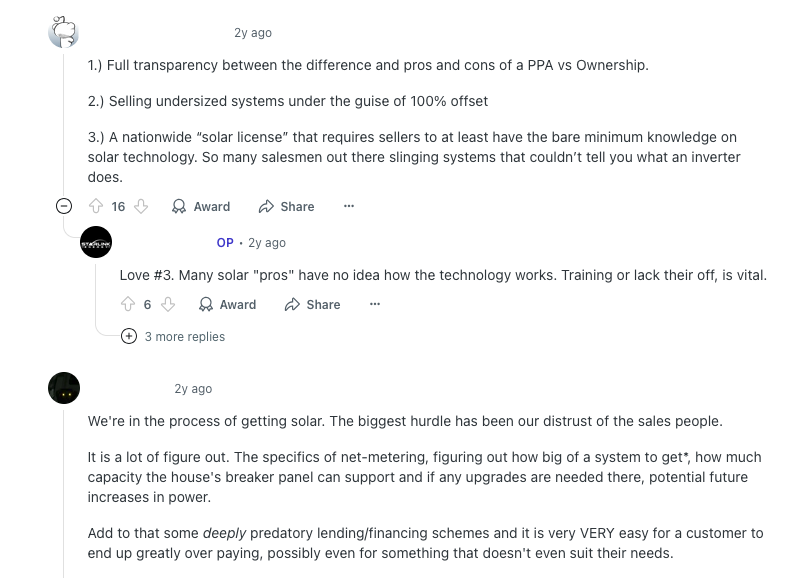When you’re planning a big home project, whether that’s fitting solar panels or upgrading your electrics, one of the first choices you make – is who to hire. For many people, the choice comes down to a local company or a national brand. Both can be great options depending on your needs, budget, and priorities. This guide explores what each option offers, includes insights from real forum discussions and gives you a few tips to help you make the best decision for your home.
What do we mean by “Local vs. national solar companies”?
A local installer is usually a smaller, local company that serves a specific region. E.g. at Glenfield Electrical – we’re based in Glenfield, just outside of Leicester and we serve Leicestershire and the surrounding areas. These local businesses often have a close connection to their area and may operate with a smaller team handling everything from start to finish. They also tend to be more adaptable to unique requests or bespoke projects, tailoring solutions to fit your specific property or preferences.
A national installer, by contrast, is a larger company that works across multiple regions or the whole country, think Project Solar or energy companies like Eon or Octopus – who offer solar panels installation services. These businesses typically have more staff, wider resources, and the backing of a recognisable brand. However, national providers sometimes rely more on standardised packages and processes, which can be less flexible if you’re looking for something outside the norm. However, these larger national businesses may have more streamlined operations.
Real customer insights: Solar installations
We’re expert local installers but to get real insights, you need to hear it from first hand solar homeowners’ experiences. That’s why we’ve looked on the internet for real insight across local forums, Reddit, and Facebook groups.
When it comes to solar, homeowners are completely frank about their experiences. This can be extremely useful for anyone who is considering an installation but is unsure of where to start. Online forums especially are full of first-hand comparisons between local and national installers.
Comparing costs: are local solar installers cheaper than national companies?
Price is often the first big deciding factor. Many homeowners report that local companies can offer more competitive quotes, partly because they have lower overheads and more flexibility in pricing. However, larger national companies sometimes match or beat these rates, especially if they buy materials in bulk or run seasonal promotions.
One Reddit user found that, during their search for solar panels, national companies were typically £1,000–£2,000 more expensive than local companies for the same number of panels and battery capacity. We found this was a common opinion shared by users.

Service and communication: Local companies vs national solar installations
Local businesses often pride themselves on personal service, with direct contact from the person managing your project and a strong understanding of the area.
National companies may have more structured systems in place, with dedicated teams handling each stage of the job and formal processes to keep things running smoothly.
It’s also essential to check for professional accreditations no matter who you choose. For solar installations, look for MCS approval, which means your installation will be above board and certified. For electrical work, NICEIC certification shows that the installer meets industry-recognised safety and competence standards. Whether local or national, any reputable company should be able to provide proof of these credentials.
Reputation and trust
Local companies often build their reputation through word-of-mouth. It can be easy to find neighbours or local businesses who have used their services and can share their experience.
National companies rely more on brand recognition and visibility. They usually have plenty of published reviews and case studies to browse through, which can give extra insight if you’re new to the market.

Another forum user compared quotes and discovered their chosen local installer, recommended by several neighbours, offered a quote 50% lower than a well-known national brand, with more panels and greater battery capacity included.
While many forum comments favoured local installers for their cost and personal service, some homeowners had positive experiences with national provider. For example, one user noted:

From our research solar panel buyers tended to prefer local installers but it wasn’t always the case. Above, the homeowner found a better deal with a national installer, while their local quotes were higher and came with added pressure to choose specific equipment. While local companies often win on service and value, sometimes national providers offer better deals because they have greater buying power lowering materials costs.
However, the package offered by national companies, particularly energy suppliers, would often vary with some homeowners quoted radically different prices for similar systems even from the same company.
Overall, each case is completely dependent on where you live and what companies are available locally to you. At Glenfield Electrical we’d recommend approaching 3 installers so you can compare the service, the equipment, guarantees and price.

As one user put it, the choice often comes down to priorities: cost savings and local
trust, or the standardisation and brand recognition of larger companies. Either way, gathering multiple quotes is essential when looking around for the best possible deal.
These stories show that there’s no one-size-fits-all answer. Some people find better value and a personal touch with local specialists, while others prefer the reassurance of a big national name. Interestingly, in our research we found that local installers tend to receive more positive feedback overall, particularly when it comes to cost and customer service. However, this does not negate the positives of national installers, who often present the advantage of clear packages and brand-backed reassurance.
Who is designing your solar panel system – an electrician or a salesperson?
Solar panel and battery systems are complex electrical systems that need expertise and experience to design. Sizing inverters correctly is imperative, so systems are both productive (to maximise your investment) but more importantly – safe.
Although regarding the US rather than the UK this Reddit screengrab shows the issues that can arise with non-experts designing systems.

The need for real expertise from systems designed by experts with a background the industry is backed up by the rise in solar related fires.
Fires linked to solar PV are on the rise, with government data showing just three recorded in 2010 compared to 60 in 2021, and 66 in the first half of 2023 alone. While panels themselves are safe when properly installed and maintained, the risks come from poor wiring, arc faults, lack of maintenance and external damage.
As Tom Raftery of roofing manufacturer Bauder warns, “These fires are very much in the insurance industry’s sights right now.” Even if only 0.1% of systems experience issues, the sheer scale of installations – around 14 million panels fitted each year – means small percentages translate into real incidents. With no consistent fire testing standards and many older, poorly maintained systems now reaching 10–12 years of age, quality design and installation is vital: as Raftery stresses, the sector needs enough people “who know what they’re doing.”
Who is really installing your solar panels?
There are roughly only 4000 companies MCS certified companies in the UK and approximately 230,000 qualified electrician – although that number has fallen by 20,000 since 2019. Most of those electricians work on domestic and commercial electrical systems rather than solar installations too,
There have been over 500,00 domestic solar installations since 2022 so demand is rocketing with fewer qualified personnel to carry them out – to put it simply there aren’t enough installers out there to meet the demand.
That’s why prospective solar panel customers need to be wary of sub-contracting, particularly from the national companies. At Glenfield Electrical we have been approached by Ovo Energy to install solar panels as sub-contractors, so we know it happens.
Full disclosure: Glenfield Electrical are Octopus Energy partners for when their installs fall outside of their standard install criteria, however as of August 2025 we have never carried out an installation on their behalf.
Aftercare and support
It’s also worth thinking about what happens after the work is complete, as this can make a big difference to your overall experience. Good support can save you stress and unexpected costs down the line.
Local companies often excel in responsiveness. If an issue arises, they may be able to send someone out quickly because they’re nearby, and you often deal directly with the person who managed your project. This can make repairs or follow-up checks feel straightforward and personal.
Alternatively, national companies usually have formal warranty procedures and dedicated customer service teams. While response times can sometimes be slower due to the larger scale, you often benefit from clearly defined processes and long-term guarantees. It’s worth asking specific aftercare questions:
- How quickly can they respond to any issues?
- What kind of warranty do they offer, and what does it cover?
- Do they offer maintenance visits or annual system checks?
- Who will be your point of contact if problems arise?
Risk factors to watch out for
No matter which type of installer you’re considering, it’s important to be aware of red flags. Common risks include:
- No references or poor online reviews – a trustworthy installer should be able to provide both.
Pushy sales tactics – including “today only” prices, which many forum users specifically warned against. These offers can be high-pressure sales tactics designed to stop you from exploring other options.

- Unclear warranties or vague contracts – always make sure everything is written down and agreed before work starts.
- Lack of certifications – if a company cannot provide proof of MCS or NICEIC approval, that’s a major warning sign.
How to decide what’s best for you
Ultimately, the most important thing is choosing a company you trust to deliver quality work and ongoing support. Take your time, compare not just prices but also service and reputation, and don’t be afraid to ask questions along the way.
For homeowners in Leicester and the surrounding areas, Glenfield Electrical combines the reassurance of professional standards with the personal touch of a local business, giving you the best of both worlds.
At Glenfield Electrical, we believe in clear, pressure-free advice. If you’d like to compare options for your home project, contact us on 0116 216 2550 or email solar@glenfieldelectrical.com for a no-obligation consultation with our fully qualified solar experts.
